In recent years, the field of nanoelectronics has emerged as a transformative force in the world of technology, pushing the boundaries of what is possible. By manipulating materials at the nanometer scale, researchers and engineers are developing electronic devices that are not only smaller but also significantly faster and more efficient. This development is fundamentally changing the way we interact with technology and is opening up a world of possibilities across various industries.
At the heart of nanoelectronics is the ability to work with materials at the nanometer level—one billionth of a meter. This incredibly small scale offers unique physical and chemical properties that are not present in larger forms of the same materials, allowing for the creation of components that are far superior to those used in traditional electronics. One area where nanoelectronics has made a significant impact is in the miniaturization of devices. From smartphones to laptops to wearable technology, the trend towards smaller devices has been relentless. Nanoelectronics is facilitating this trend by enabling the production of components that are not only smaller but also more powerful and energy-efficient, ensuring that devices can maintain high performance despite their reduced size.
The speed at which electronic devices operate is another critical aspect benefiting from nanoelectronics. As we demand faster computation and data processing capabilities, nanoelectronics is delivering breakthroughs in transistor technology, the building blocks of electronic circuits. By reducing the size of transistors, they can switch on and off more quickly, thereby increasing the overall speed of electronic devices. The development of ultra-fast, nanoscale transistors has already paved the way for advancements in computing power, enabling faster internet connections, quicker data processing, and enhanced performance of artificial intelligence systems.
Efficiency is also a key advantage of nanoelectronics. Smaller components consume less power, thus contributing to energy-saving initiatives and allowing battery-powered devices to operate longer on a single charge. Enhanced efficiency is crucial for the growing Internet of Things (IoT) ecosystem, where an increasing number of devices are interconnected. With more efficient nanoelectronic components, these devices can perform complex tasks without being tethered to a constant power supply, making them practical for a wide range of applications from smart homes to autonomous vehicles.
Beyond consumer electronics, nanoelectronics is set to revolutionize industries such as healthcare, energy, and transportation. In healthcare, for example, nanoscale sensors and devices can be used for early disease detection and personalized treatment plans, paving the way for innovations such as smart implants and wearable health monitors. In the energy sector, nanoelectronics is contributing to the development of more efficient solar cells and energy storage systems, which are essential for sustainable clean energy solutions. Similarly, in transportation, advancements in nanoelectronics are supporting the development of smarter, more efficient transportation systems, including electric vehicles and smart city infrastructure.
As the field of nanoelectronics continues to evolve, it faces challenges as well, such as the high costs associated with research and development and the need for new manufacturing techniques capable of producing components at this scale. Furthermore, the ethical and environmental implications of working with nanomaterials warrant careful consideration. However, as these challenges are addressed, the potential benefits are boundless, promising a future where technology is seamlessly integrated into every aspect of life.
In conclusion, nanoelectronics is unlocking unprecedented possibilities in technology, driving the creation of smaller, faster, and more efficient devices. As this field continues to advance, our relationship with technology will deepen, leading to smarter, more interconnected systems that improve the quality of life and drive innovation across all sectors. Through continued research and innovation, nanoelectronics will undoubtedly remain a cornerstone of technological progress, shaping the future in profound ways.
